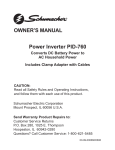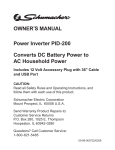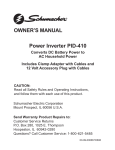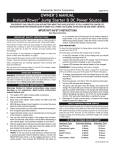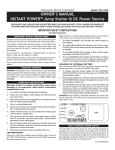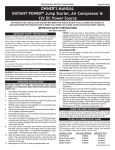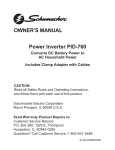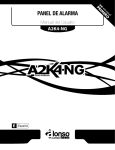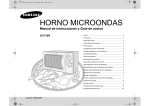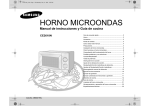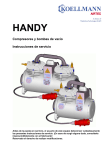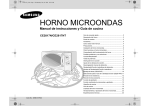Download Schumacher PID-750 User's Manual
Transcript
OWNER’S MANUAL Power Inverter PID-750 Converts DC Battery Power to AC Household Power Includes Battery Cables CAUTION: Read all Safety Rules and Operating Instructions, and follow them with each use of this product. Schumacher Electric Corporation Mount Prospect, IL 60056 U.S.A. Send Warranty Product Repairs to: Customer Service Returns P.O. Box 280, 1025 E. Thompson Hoopeston, IL 60942-0280 Questions? Call Customer Service: 1-800-621-5485 00-99-000724/0208 IMPORTANT SAFETY INSTRUCTIONS Save These Instructions Before using your PID-750, read and understand this Owner’s Manual. • Keep the inverter well ventilated in order to properly disperse heat generated while it is in use. Make sure there are several inches of clearance around the top and sides and do not block the slots of the inverter. • Make sure the inverter is not close to any potential source of flammable fumes, gases or clothing. • Keep the inverter dry. • DO NOT allow the inverter to come into contact with rain or moisture. • DO NOT operate the inverter if you, the inverter, the device being operated or any other surfaces that may come in contact with any power source are wet. Water and many other liquids can conduct electricity, which may lead to serious injury. • Do not place the inverter on or near heating vents, radiators or other sources of heat. • Do not place the inverter in direct sunlight. The ideal air temperature for operation is between 50° and 80°F. • Do not use the inverter near an open engine compartment. 2 • Only connect the power inverter to a 12-Volt battery. Make sure the AC plug connection is tight. • Do not modify the AC receptacle in any way. • Use only 45-amp fuses. • This device does not include an internal Ground Fault Circuit Interrupter (GFCI). For GFCI protection, use a Coleman Cable 02822 GFCI outlet. WARNING: Handling the cord on this product or cords associated with accessories sold with this product, may expose you to lead, a chemical known to the State of California to cause cancer and birth defects or other reproductive harm. Wash hands after handling. Before Using PID-750 power Inverter It is important to know the continuous wattage of the device you plan to use with the inverter. The PID-750 must be used with devices drawing 750 watts or less. If the wattage is not marked on the device, an estimate can be made by multiplying the AC input current (Amps) by the AC voltage (110V). Devices like TVs, fans or electric motors require additional power to start (commonly known as the “starting or peak power”). The PID-750 can supply a momentary surge in wattage; however even devices rated less than the maximum 750 watts can exceed the inverters surge capability and cause an automatic overload shutdown. 3 Make sure the device you are using is compatible with a modified sine wave inverter. operating instructions Connecting to a 12 Volt Battery: The PID-750 battery clamps allow quick hook-up to a 12V battery. Make sure the PID-750 and the device(s) are turned OFF. 1. Unscrew the positive (red) and negative (black) plastic connector knobs from the back of the inverter. 2. Slip the end of the red (positive) battery cable clamp wire over the red (positive) threaded extension and then screw on the connector knob and tighten so the wire is firmly attached. Repeat the same process for the black wire. 3. Connect the red (positive) battery cable to the positive (+) battery terminal taking care to shield eyes, clothing and hands from battery acid. Connect the black battery clamp to negative (-) ground on the battery. 4. Plug the device into the Power Inverter 750 AC outlet. NOTE: If using more than one device, the total combined wattage of both devices must not exceed 750 watts. 5. To turn the inverter ON ( I ) or OFF ( 0 ), press and hold button for 2 seconds. Turn the inverter ON. 4 6. Turn the device ON. 7. To disconnect the PID-750, reverse the above steps. NOTE: If there is a short circuit or power surge in the device, the alarm will sound. To turn off the alarm, press the button. Cycle inverter power OFF and ON. If problem persists, use a larger inverter or a smaller device. POWER SOURCE Your average automobile or marine battery at full charge will provide an ample power supply to the inverter for approximately 3 hours when the engine is off. The actual length of time the inverter will function depends on the age and condition of the battery and the power demand being placed by the device being operated with the inverter. Turn OFF the device plugged into the inverter and the inverter before starting the engine. To maintain battery power, run the engine every 2 to 3 hours for approximately 10 minutes to recharge the battery. While the PID-750 draws very low amperage when not in use, it should be unplugged to avoid battery drain. 5 Usage Examples Device Type Estimated Wattage Cell Phones, MP 3 players, Camcorders 10 watts Portable Work Light 25 watts CD/DVD Player 35 watts VCR 40–60 watts Clock Radio 50 watts Laptop 75 watts Stereo System 30–100 watts Game Console (Xbox) 100 watts 12" 3 Speed Fan 230 watts 13" Color TV/VCR Combo 250 watts Blender 300 watts 25" Color TV 300 watts PC & Monitor 400 watts 3/8" Drill 500 watts 6 LED DISPLAY The LED readouts identify the current status of the PID-750. VOLTAGE IN: Voltage of vehicle’s battery or Portable Power jump starter/DC power source. VOLTAGE OUT: Voltage supplied to device through AC receptacle. POWER OUT: Power or wattage supplied to device plugged into the inverter. An audio alarm will sound when the following codes display. To stop the alarm, press the ON/OFF LED Selector button: BaD – Inverter is not functional. See warranty and call Customer Service 800-621-5485 (Hours: 7 a.m. – 4:30 p.m. CST). Hi b – Vehicle’s battery voltage is more than 15.5 volts. Inverter will automatically restart after the voltage drops below 15.0 volts. HiP – The continuous load demand from the device exceeds 750 watts. HoT – Inverter is overheated and automatically turns off for a period of 1–3 minutes to cool. Make sure inverter is well ventilated. It will automatically restart after it cools. Lo b – Vehicle’s battery voltage is less than 10.5 volts. SC – Short circuit, power surge or overload in the device. 7 TROUBLESHOOTING PROBLEM: Alarm is On Reason/Solution 1. Display shows SC. Device has a short circuit or demands too much surge power. Cycle inverter power OFF and ON. If problem persists, use a larger inverter or a smaller device. Remove defective device. See warranty and call Customer Service 800-621-5485 (Hours: 7 a.m. – 4:30 p.m. CST). 2. Display shows Lo b. 12 Volt battery too low. Recharge/replace low battery. 3. Display shows Voltage In between 10.5 and 11.0 Volts. 12 Volt battery is low. Recharge/replace low battery. Inverter will automatically shut off after battery voltage reaches 10.5 volts. 4. Display shows Hi b. 12 Volt voltage is too high. If in a vehicle, repair/replace the alternator or charging system. Use a properly sized and rated 12 Volt battery. If input voltage returns to 15 volts or less, the inverter will automatically restart. 8 5. Display shows HiP. Device demands more than 750 Watts continuous power. Cycle inverter power OFF and ON. If problem persists, use a larger inverter or a smaller device. 6. Display shows HoT. Inverter is too hot. Increase ventilation to inverter. Move inverter to a cooler area. Reduce the power consumption of the device. Inverter will automatically reset after cooling. PROBLEM: Inverter Does Not Turn On Reason/Solution 1. Poor contact at terminals. Unplug and reinsert PID-750. 2. Fuse is blown. A blown fuse is usually caused by reverse polarity or a short circuit within the inverter. To replace, contact a qualified service technician who will diagnose the inverter and replace the fuse with the appropriate replacement. 3. Inverter may be defective. See warranty and call Customer Service 800-621-5485 (Hours: 7 a.m. – 4:30 p.m. CST). 9 SPECIFICATIONS Maximum Continuous Power.............................. 750 Watts Surge Capacity (Output Wattage)..................... 1500 Watts No Load Current Draw....................................... <.50 Amps Wave Form.......................................... Modified Sine Wave Input Voltage Range.................................... 11 – 15.5V DC Low Battery Alarm................................... 10.7V – 11.3V DC Output Voltage.......................................... 110V – 125V AC Low Battery Shutdown............................10.2V – 10.8V DC High Battery Shutdown...........................15.0V – 16.0V DC Optimum Efficiency............................................ >90% max AC Outlets....................................... Two, 110V AC 3-Prong Battery Cables...................................................... One Pair Fuse.................................................................Two, 45 Amp 10 Limited Warranty Schumacher Electric Corporation warrants your inverter to be free from defects in material and workmanship, excepting abuse or misuse, for a period of two years from the date of sale to the original user or consumer purchaser. If your inverter malfunctions or fails within the 24-month warranty period because of a defect in material or workmanship, we will repair it without charge or replace it. This warranty is in lieu of all other express warranties. The duration of any implied warranty, including but not limited to, any implied warranty of merchantability or fitness for a particular purpose made in respect to your unit, is limited to the period of the express warranty set forth above. For warranty service, return your inverter as well as proof of purchase to the factory or a designated agent: Schumacher Electric Corporation Warranty Service Department 1025 E. Thompson, P.O. Box 280 Hoopeston, IL 60942-0280 Phone: 800-621-5485 (Hours: 7 a.m. - 4:30 p.m. CST) You will be responsible for all insurance and freight or other transportation charges to the factory or point of repair. We will return your inverter freight prepaid if repair is covered under warranty. Your inverter should be properly packed to avoid damage in transit since we will not be responsible for any such damage. In no event shall Schumacher Electric Corporation be liable for consequential damages. Some states do not allow limitations on the length of the implied warranty or the exclusion or limitations of incidental or consequential damages, so the above limitations or exclusions may not apply to you. This warranty gives you specific legal rights and you may also have other rights which may vary from state to state. 11 notes 12 MANUAL DEL DUEÑO Inversor de Potencia PID-750 Convierte Potencia de Batería CC en Potencia Doméstica CA Incluye y Cables de Batería PRECAUCIÓN: Lea todos los Reglamentos de Seguridad e Instrucciones de Operación y sígalos en cada uso de este producto. Schumacher Electric Corporation Mount Prospect, IL 60056 U.S.A. Envíe Productos para Reparación bajo Garantía a: Customer Service Returns P.O. Box 280, 1025 E. Thompson Hoopeston, IL 60942-0280 ¿Preguntas? Llame al Customer Service: 1-800-621-5485 00-99-000724/0208 INSTRUCCIONES IMPORTANTES DE SEGURIDAD Guarde Estas Instrucciones Antes de usar su PID-750, lea y entienda este Manual del Dueño. • Mantenga el inversor bien ventilado para dispersar debidamente el calor generado mientras esté en uso. Asegúrese de que haya varias pulgadas de espacio alrededor de la tapa y los lados del inversor. No bloquee las ranuras del inversor. • Asegúrese de que el inversor no esté cerca de ninguna fuente potencial de humos inflamables, gases o ropa. • Mantenga el inversor seco. • NO permita que el inversor tenga contacto con la lluvia o la humedad. • NO opere el inversor si usted, el inversor mismo, el dispositivo que se está operando ni ninguna otra superficie que pueda tener contacto con alguna fuente de potencia están mojados. El agua y muchos otros líquidos tienen capacidad de conducir la electricidad, lo que puede causar lesiones serias. • No coloque el inversor sobre ni cerca de respiraderos de calor, radiadores, u otras fuentes de calor. • No exponga el inversor directamente al sol. La temperatura de aire ideal para operación es entre 50° y 80°F. • No lo use cerca de un compartimiento de motor abierto. 2 • Conéctese el Invertidor de corriente a una batería de 12 Voltios. Asegúrese que la clavija esté bien ajustada. • No modifique el receptáculo CA de ninguna manera. • Use solamente fusible de 45 amperios. • Este dispositivo no incluye Disyuntor de Circuito por Falla a Tierra (GFCI). Para protección GFCI, use un tomacorriente 02822 GFCI de Coleman Cable. ADVERTENCIA: El manejo del cordón en este producto o los cordones asociados con accesorios vendidos con este producto, puede exponerle al plomo, un producto químico conocido en el estado de California como causa de cáncer y defectos de nacimiento u otro daño reproductivo. Lávese las manos después de manejarlo. Antes de Usar el Inversor PID-750 Es importante saber el vataje continuo del dispositivo que se piensa usar con el inversor. El PID-750 tiene que usarse con dispositivos que requieren 750 vatios o menos. Si el vataje no está marcado en el dispositivo, se puede hacer un cálculo multiplicando la corriente de entrada CA (Amperios) por el voltaje CA (110V). Dispositivos tales como TVs, ventiladores o motores eléctricos requieren potencia adicional para encenderse (conocido comúnmente como “potencia de encender o de pico”). El PID-750 puede proveer un aumento momen3 táneo en vataje; sin embargo, hasta los dispositivos con régimen menor que el máximo de 750 vatios pueden exceder la capacidad de aumento del inversor y causar un cierre automático por sobrecarga. Asegúrese de que el dispositivo que se está usando sea compatible con un inversor de onda sinusoidal modificada. INSTRUCCIONES DE OPERACIÓN Para conectar a una batería de 12 voltios: Las pinzas con cables del PID-750 permiten conexión rápida con una batería de 12 voltios. Asegúrese que el PID-750 y los dispositivos estén apagados. 1. Desentornille la perilla conectora plástica positiva (roja) y la negativa (negra) del dorso del inversor. 2. Deslice el extremo del alambre rojo (positivo) de la pinza del cable de la batería sobre la extensión roscada roja (positiva) y luego enrosque la perilla conectora y apriétela para que el alambre quede firmemente conectado. Repita el mismo proceso para el alambre negro. 3. Conecte el cable rojo (positivo) de la batería al terminal positivo (+) de la batería, cuidándose de proteger los ojos, la ropa y las manos del ácido de la batería. Conecte la pinza negra de la batería a tierra negativa (-) en la batería. 4 4. Enchufe el dispositivo en el tomacorriente CA del PID-750. NOTA: Al usar más de un dispositivo, el voltaje combinado total de los dos dispositivos no tiene que sobrepasar los 750 vatios. 5. Para poner el inversor en ON (I) o en OFF (O), Oprima y sostenga el botón por dos segundos. Ponga el inversor en ON. 6. Ponga el dispositivo en ON. 7. Para desconectar el PID-750, invierta los pasos anteriores. NOTA: Si hay cortocircuito o exceso de potencia en el dispositivo, la alarma suena. Para apagar la alarma, ponga el botón. Encienda y apague la potencia del inversor varias veces. Si el problema persiste, use inversor más grande o dispositivo más pequeño. FUENTE DE POTENCIA Una batería normal de automóvil o marino a plena carga provee un amplio surtido de potencia al inversor por aproximadamente 3 horas cuando el motor está apagado. El verdadero tiempo que el inversor funciona depende de la edad y la condición de la batería así como cuánta potencia el dispositivo operándose con el inversor demanda de la batería. 5 Antes de encender el motor, ponga en OFF el dispositivo enchufado en el inversor y el inversor mismo. Para mantener la potencia de la batería, haga que el motor funcione por aproximadamente 10 minutos cada 2 a 3 horas para recargar la batería. Si bien el PID-750 recibe amperaje muy bajo cuando no está en uso, debe quedar desenchufado para evitar desgaste a la batería. EJEMPLOS DE USOS Tipo de Dispositivo Vataje Estimado Teléfonos Celulares, Tocadores MP 3, Cámaras Grabadoras 10 vatios Luz de Trabajo Portátil 25 vatios TV Blanco/Negro 12" 30 vatios Tocador de CDs/DVDs 35 vatios Radio/Reloj 50 vatios Grabadora de video 60 vatios Computador Portátil 75 vatios Sistema de Estéreo 100 vatios Consola de Juegos (Xbox) 100 vatios Ventilador a 3 velocidades 12" 230 vatios TV/VCR Comb. a Colores 13" 250 vatios Mezcladora 300 vatios 6 Tipo de Dispositivo Vataje Estimado TV a Colores 25" 300 vatios PC y Pantalla 400 vatios Taladradora 3/8" 500 vatios LECTURAS POR LED Las lecturas por LED identifican el estado actual del PID-750. VOLTAGE IN: El voltaje de la batería del vehículo o del arranque inmediato Portable Power/fuente de potencia CC. VOLTAGE OUT: El voltaje proporcionado al dispositivo mediante el receptáculo CA. POWER OUT: La potencia o vataje proporcionado al dispositivo enchufado en el inversor. Una alarma auditiva suena cuando se muestran los siguientes códigos. Para apagar la alarma, oprima el botón selector LED ON/OFF. BaD – El inversor no es funcional. Vea la garantía y llame al Customer Service 800-621-5485 (Horas: 7 a.m. – 4:30 p.m. Hora Central). Hi b – El voltaje de la batería del vehículo sobrepasa los 15.5 voltios. El inversor se reenciende automáticamente después de que el voltaje baje a menos de 15.0 voltios. HiP – La demanda continua de carga del dispositivo sobrepasa los 750 vatios. 7 HoT – El inversor está sobrecalentado y automáticamente se apaga por un período de 1-3 minutos para enfriarse. Asegúrese de que el inversor esté bien ventilado. Se reenciende automáticamente después de enfriarse. Lo b – El voltaje de la batería del vehículo es menos de 10.5 voltios. SC – Hay cortocircuito, sobretensión de potencia o sobrecarga en el dispositivo. SOLUCIÓN DE PROBLEMAS PROBLEMA: El Inversor no se Enciende. Causa/Solución 1. La pantalla muestra . El dispositivo tiene cortocircuito o demanda excesiva de sobretensión de energía. Encienda y apague la potencia del inversor varias veces. Si el problema persiste, use un inversor más grande o dispositivo más pequeño. Quite el dispositivo defectuoso. Vea la garantía y llame a Customer Service 800-621-5485 (Horas: 7 a.m. – 4:30 p.m. Hora Central). 2. La pantalla muestra . La batería de 12 voltios está muy baja. Recargue/reemplace la batería baja. 8 3. La pantalla muestra Voltaje entre 10.5 y 11.0 voltios. La batería de 12 Voltios está baja. Recargue/reemplace la batería baja. El Inversor reenciende automáticamente después de que el voltaje de la batería llegue a 10.5 voltios. 4. La pantalla muestra . El voltaje de 12 voltios está muy alto. Si sucede dentro de un vehículo, repare/reemplace el alternador o el sistema de cargar. Use una batería de 12 voltios de tamaño y régimen apropiados. Si el voltaje de entrada vuelve a 15 voltios o menos, el inversor se reenciende automáticamente. 5. La pantalla muestra . El dispositivo demanda más de 750 Voltios de potencia continua. Encienda y apague la potencia del inversor varias veces. Si el problema persiste, use un inversor más grande o dispositivo más pequeño. 6. La pantalla muestra HoT. El inversor está muy Caliente. Aumente la ventilación al inversor Mueva el inversor a un área más fresca. Reduzca el consumo de potencia del dispositivo El inversor se repone automáticamente después de enfriarse. 9 PROBLEMA: El Inversor No se Enciende. Causa/Solución 1. Mal contacto en los terminales. Desenchufe y reinserte el Inversor de PID-750. 2. El fusible se quema. Un fusible quemado es normalmente causado por polaridad inversa o cortocircuito dentro del inversor. Para reemplazarlo, póngase en contacto con un écnico de servicio calificado quien hará diagnóstico del inversor y reemplazará el fusible con el reemplazo apropiado. 3. El Inversor puede ser defectuoso. Vea la garantía y llame a Customer Service 800-621-5485 (Horas: 7 a.m. – 4:30 p.m. Hora Central). 10 ESPECIFICACIONES Potencia Continua Máxima.................................750 Vatios Capacidad de Sobretensión (Potencia Pico)....1500 Vatios Requisito de Corriente sin Carga....................... <.50 Amps Forma de Onda...................... Onda Sinusoidal Modificada Rango de Voltaje de Entrada....................... 11 – 15,5V CC Alarma de Batería Baja........................... 10,7V – 11,3V CC Voltaje de Salida....................................... 110V – 125V CA Cierre por Batería Baja...........................10,2V – 10,8V CC Cierre por Batería Alta............................15,0V – 16,0V CC Eficacia Óptima............................................ >90% máxima Tomacorrientes CA.......................Dos, 110V CA 3 Clavijas Cables de Batería....................................................... Un Par Fusible...........................................................Dos, 45 Amps 11 Garantía Limitada Schumacher Electric garantiza que su inversor está libre de defectos en materiales o mano de obra, exceptuando el abuso o mal uso, por el período de dos años desde la fecha de venta al usuario original o comprador consumidor. Si su inversor no funciona bien o falla durante el período de la garantía de 24 meses, debido a defecto en materiales o mano de obra, lo repararemos gratis o lo reemplazaremos. La presente garantía reemplaza toda otra garantía expresa. La duración de cualquier garantía implícita, incluyendo mas no limitado a, cualquier garantía implícita de comerciabilidad o idoneidad para un propósito específico hecha con respecto a su unidad, se limita al período de la garantía expresa declarada arriba. Para servicio bajo garantía, devuelva su inversor así como prueba de compra, a la fábrica o a un agente designado: Schumacher Electric Corporation Warranty Service Department 1025 E. Thompson, P.O. Box 280 Hoopeston, IL 60942-0280 Tel.: 800-621-5485 (Horas: 7 a.m. - 4:30 p.m. Hora Central) Usted será responsable por todo costo de seguro y de carga u otro transporte hasta la fábrica o punto de reparación. Devolveremos su inversor con transporte prepagado si la reparación está cubierta por la garantía. Su inversor debe estar debidamente empacado para evitar daños durante el transporte, puesto que no seremos responsables por ningún daño tal. Bajo ninguna circunstancia Schumacher Electric Corporation será responsable por daños consecuentes o incidentales. Algunos estados no permiten limitaciones en el período de la garantía limitada 12 o la exclusión o limitación de daños incidentales o consecuentes, de modo que las limitaciones o exclusiones anteriores quizás no se apliquen a usted. Esta garantía le concede derechos legales específicos y usted puede también tener otros derechos que varían de estado en estado. 13 notas 14
This document in other languages
- español: Schumacher PID-750




























